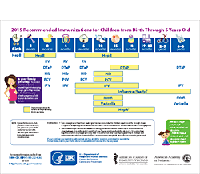Influenza (Flu) Vaccine Safety
Flu Disease and How to Protect Against It
Flu is a contagious respiratory illness caused by influenza viruses. It can cause mild to severe illness. Serious outcomes of flu infection can result in hospitalization or death. Some people, such as older people, young children, and people with certain health conditions, are at high risk for serious flu complications. You can protect against flu with safe, effective vaccination.
Flu Vaccine Side Effects
Flu vaccines are very safe. Vaccines, like any medicine, can have side effects. Most people who get the flu vaccine have no side effects at all. Some people report having very mild side effects, like a sore arm from the shot for a day or two. The most common side effects are usually mild and go away on their own.
Common Side Effects of Flu Vaccine:
- Sore, red, or swollen arm from the shot
- Hoarseness
- Sore, red or itchy eyes
- Cough
- Fever
- Aches
- Headache
- Itching
- Fatigue
Young children who get inactivated flu vaccine and pneumococcal vaccine at the same time may be at increased risk for seizures caused by fever. Tell your doctor if a child who is getting flu vaccine has ever had a seizure.
Brief fainting spells can happen after any medical procedure, including vaccination. Sitting or lying down for about 15 minutes can help prevent fainting, and injuries caused by a fall. Tell your doctor if you feel dizzy, or have vision changes or ringing in the ears.
Severe shoulder pain and reduced range of motion in the arm where a shot was given can happen, very rarely, after a vaccination.
Severe allergic reactions from a vaccine are very rare, estimated at less than 1 in a million doses. If one were to occur, it would usually be within a few minutes to a few hours after the vaccination.
Available Flu Vaccines
For information on available flu vaccines, please visit Approved Influenza Vaccines.
How CDC Monitors Flu Vaccine Safety
CDC and FDA continuously monitor the safety of vaccines after they are approved. If a problem is found with a vaccine, CDC and FDA will inform health officials, health care providers, and the public.
CDC uses three systems to monitor vaccine safety:
- The Vaccine Adverse Event Reporting System (VAERS): an early warning system that helps CDC and FDA monitor problems following vaccination. Anyone can report possible vaccine side effects to VAERS.
- The Vaccine Safety Datalink (VSD): a collaboration between CDC and nine health care organizations which allows ongoing monitoring and proactive searches of vaccine-related data.
- The Clinical Immunization Safety Assessment (CISA) Project: a partnership between CDC and several medical centers that conducts clinical research on vaccine-associated health risks.
More Resources
- Inactivated Flu Vaccine Information Statement
- Live, Intranasal Flu Vaccine Information Statement
- Flu Vaccine: Who Should Not Get Vaccinated
- General Questions and Answers About Flu Vaccine Safety
- Questions and Answers on Seasonal Flu Vaccine Safety and Pregnant Women
- Questions and Answers on Thimerosal and Influenza Vaccines
- Questions and Answers on Flu Vaccine and Guillain-Barré Syndrome (GBS)
- Febrile Seizures in Children Following Vaccination with Influenza Vaccines
- Seasonal Influenza Vaccine Safety: A Summary for Clinicians
- Page last reviewed: October 27, 2015
- Page last updated: October 27, 2015
- Content Source:


 ShareCompartir
ShareCompartir
